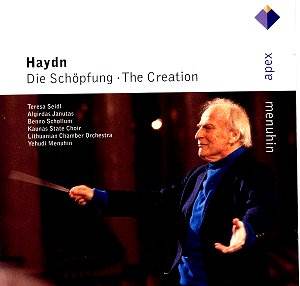When at the age of
sixty-three Haydn ended his service
to the Esterházy family, he could
have retired a wealthy and happy man.
He had, however, a good deal of creative
energy left, and his tours to England,
sponsored by the impresario Salomon
brought him even more international
fame. While in London, he attended a
festival of Handel’s oratorios in Westminster
Abbey. The august composer was both
impressed and overwhelmed, both by the
quality of Handel’s work, and by the
enormous popularity of choral/orchestral
works set in the vernacular.
Salomon persuaded Haydn
to attempt an oratorio of his own, based
on a libretto drawn from Milton’s Paradise
Lost. With the help of Baron von
Swieten, he proceeded, beginning work
on The Creation in 1794, but
not completing it until four years hence.
The first performance was a triumph
for Haydn, undoubtedly the biggest success
of his already highly successful career.
Although the concert was private, such
was the buzz on the streets that police
guards had to hold back crowds at the
hall where the work was first heard.
The general public would have to wait
another year before they were able to
hear the fabled work.
This live performance
is a bit of a mixed bag, not altogether
successful but by no means unworthy.
On the whole, the chorus delivers a
taut, well-sung and thankfully not over-blown
rendition. It is only in the more melismatic
passages that the choir experiences
difficulty, and the lines become a blur
for lack of steady, clear articulation.
There are also times when the tenors
in particular sing with a strident and
bleak tone, spoiling an otherwise very
satisfactory choral blend.
Menuhin’s tempo choices
are inconsistent in their appropriateness,
taking such well-known passages as "The
Heavens are Telling" a bit
on the slow side and presenting "Achieved
is the Glorious Work" at such
a pace as to render its grandeur moot.
On the other hand, he manages to set
the soprano aria "With Verdure
Clad" at a spot-on tempo, giving
it the elegance and grace that many
a slower performance lacks. The Lithuanian
Chamber Orchestra plays with a fine
tone and excellent articulation and
intonation. The opening "Representation
of Chaos" sadly named in the
booklet as merely "Orchestral
Introduction" is splendid,
with all of the interesting dissonances
(thought of as revolutionary in their
day) given ample time to both bloom
and bewilder.
The soloists are a
mixed bag as well, with basso Benno
Schollum taking top honors for his clarity
of tone and warm, resonant production.
The very lowest notes are a bit of a
struggle for him, but he still manages
a highly polished performance. Soprano
Teresa Seidl is too prone to scooping
and sliding, and I found that her tone
lacked a solid core. She was particularly
unconvincing in high, florid passages,
which tended to be a wash of bright
high sound. Tenor Algirdas Janutas has
a fine warm voice, but I was incessantly
annoyed by his habit of making German
words ending in ‘ch’ (dich, mich) sound
as though they were spelled with an
English ‘sh’ (thus making them dish
and mish.)
For comparison, check
out Robert Shaw’s excellent Telarc recording
(in English) or Franz Brüggen’s
live recording with the Orchestra of
the 18th Century on Philips.
Program notes are adequate
if short on analysis of the score, and
the sound quality is quite acceptable.
For the price, a worthy find, but by
no means a desert island choice.
Kevin Sutton
see alternative
German language version
Joseph
HAYDN (1732-1809)
Die Schöpfung (1798)
Edita Gruberova, soprano - Gabriel,
Eva Josef Protschka, tenor - Uriel
Robert Holl, bass - Raphael, Adam
 Arnold Schoenberg Chor Vienna Symphony
Orchestra/Nikolaus Harnoncourt Konzerthaus,
Vienna 10/11 April 1986
Arnold Schoenberg Chor Vienna Symphony
Orchestra/Nikolaus Harnoncourt Konzerthaus,
Vienna 10/11 April 1986  WARNER APEX 2564 61593-2 [58.54
+ 56.04]
WARNER APEX 2564 61593-2 [58.54
+ 56.04]


